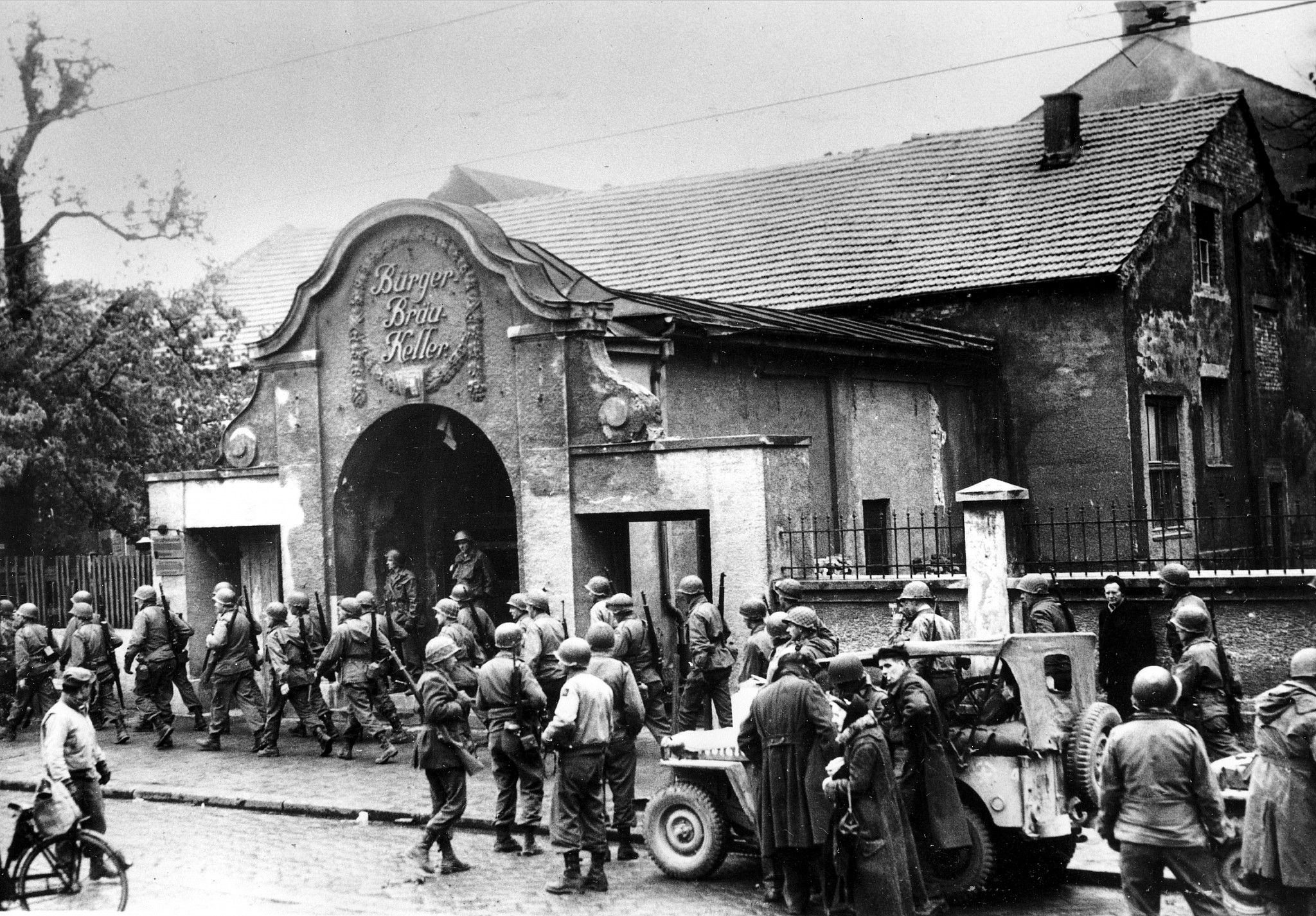Eyewitness Account by Karl Alexander von Müller of Events at the Bürgerbräukeller (Beer Hall)

American troops on May 3, 1945 outside the Burgerbraukeller, the beer hall that was the site of the failed putsch
Herr von Kahr had spoken for half an hour. Then there was movement at the entrance as if people were wanting to push their way in. Despite several warnings, the disturbance did not die
Eventually, steel helmets came into sight. From this moment on, the view from my seat was rather obscured. People stood on chairs so that I didn't see Hitler until he had come fairly near along the main gangway; just before he turned to the platform, I saw him emerge between two armed soldiers in steel helmets who carried pistols next to their heads, pointing at the ceiling. They turned towards the platform, Hitler climbed on to a chair on my left. The hall was still restless, and then Hitler made a sign to the man on his right, who fired a shot at the ceiling. Thereupon Hitler called out (I cannot recollect the exact order of his words): "The national revolution has broken out. The hall is surrounded." Maybe he mentioned the exact number, I am not sure. He asked the gentlemen Kahr, Lossow, Seisser to come out and guaranteed their personal freedom. The gentlemen did not move. The General State Commissioner [Kahr] had stepped back and stood opposite Hitler, looking at him calmly. Then Hitler went towards the platform. What happened I could not see exactly; I heard him talk to the gentlemen and I heard the words: Everything would be over in ten minutes if the gentlemen would go out with him. To my surprise the three gentlemen went out with him immediately....
The general mood—I can of course only judge from my surroundings, but I think that this represented the general feeling in the hall—was still against the whole business. One heard: "Theatrical!" "South America!" "Mexico!" That was the prevailing mood. The change came only during Hitler's second speech when he entered about ten minutes later, went to the platform and made a short speech. It was a rhetorical masterpiece. In fact, in a few sentences it totally transformed the mood of the audience. I have rarely experienced anything like it. When he stepped on to the platform the disturbance was so great that he could not be heard, and he fired a shot. I can still see the gesture. He got the Browning out of his back pocket and I think it was on this occasion that the remark about the machine gun was made. When things did not become quiet, he shouted angrily at the audience: "If you are not quiet, I shall have a machine gun put up on the gallery." In fact he had come in to say that his prediction of everything being over in ten minutes had not come true. But he said it in such a way that he finally went out with the permission of the audience to say to Kahr that the whole assembly would be behind him if he were to join. It was a complete reversal. One could hear it being said that the whole thing had been arranged, that it was a phoney performance. I did not share this opinion because Kahr's attitude seemed to contradict it. Seeing him at close quarters, one got the impression of confusion, of great dismay....
An hour after Hitler's first appearance the three gentlemen came back into the hall with Hitler and Ludendorff. They were enthusiastically received. On the platform Kahr began to speak first without being requested to and gave the speech which was printed word for word in the papers. Ludendorff too, in my opinion, spoke without being requested to, whereas Lossow and Seisser only spoke after repeated requests—I can't remember the words, but only the gestures—on Hitler's part. If I am to depict the impression made by the gentlemen on the platform, I would say that Kahr was completely unmoved. His face was like a mask all evening. He was not pale or agitated; he was very serious, but spoke very composedly. I got the impression that there was a melancholy look about his eyes. But that is perhaps being subjective. Hitler on the other hand, during this scene was radiant with joy. One had the feeling that he was delighted to have succeeded in persuading Kahr to collaborate. There was in his demeanor, I would say, a kind of childlike joy, a very frank expression which I shall never forget. Excellency Ludendorff by comparison was extremely grave; when he came in he was pale with suppressed emotion. His appearance as well as his words were those of a man who knew it was a matter of life and death, probably death rather than life. I shall never forget his expression. It was such that when I heard in town on the following day the rumor that he had been killed, I said to myself: That's what he looked like last night. Lossow's expression was very different; there was something detached, relaxed about his whole attitude. I don't want to make a party point but, if I am to describe it, it struck me that he made a slightly ironical fox face. A certain impenetrable smile never left his features. Seisser was pale and upset. He was the only one who gave the impression of personal agitation, of external agitation. His words were merely a variant of Lossow's. The report in the papers of the words of these two gentlemen was not correct: it was somewhat touched up....
